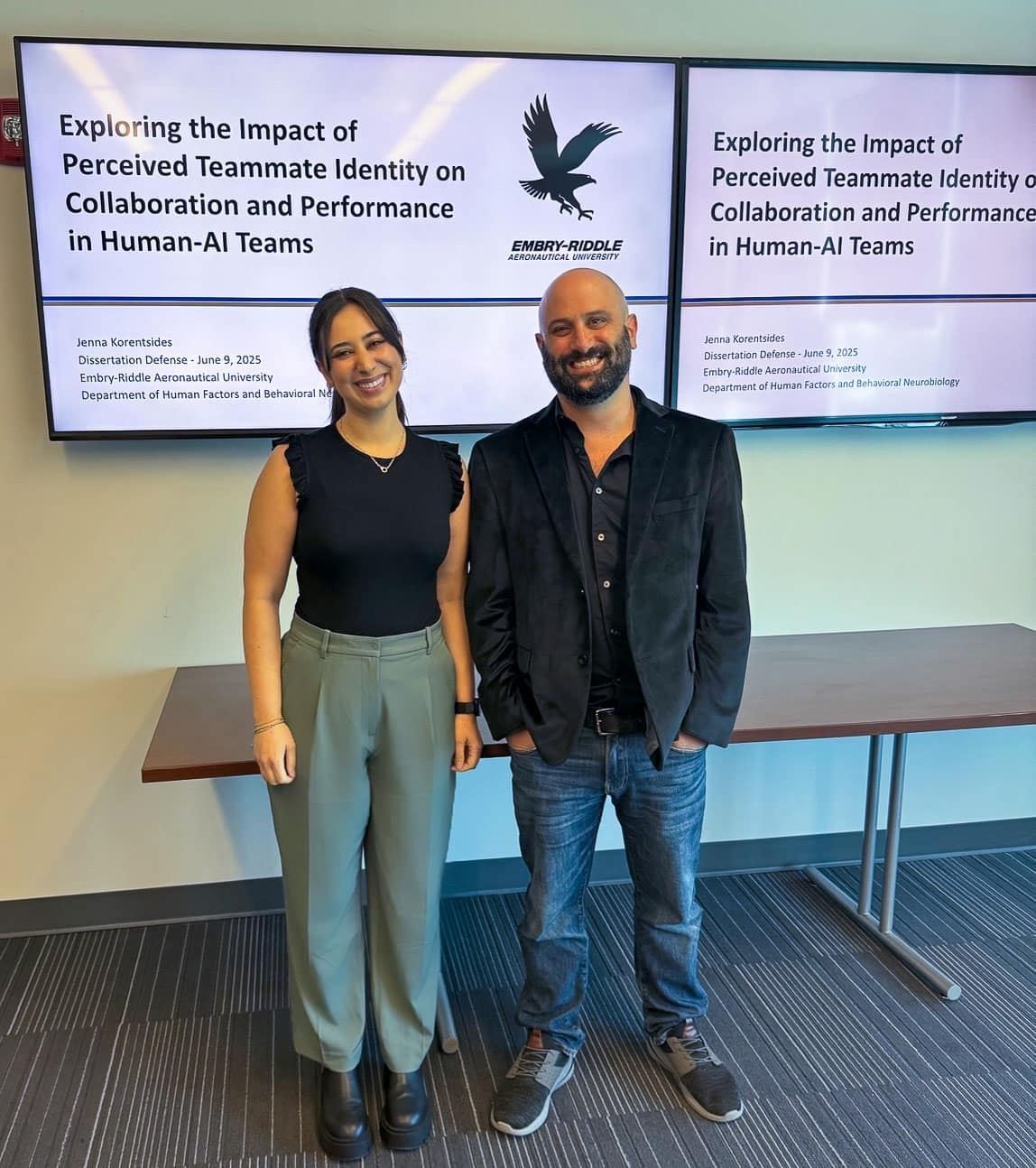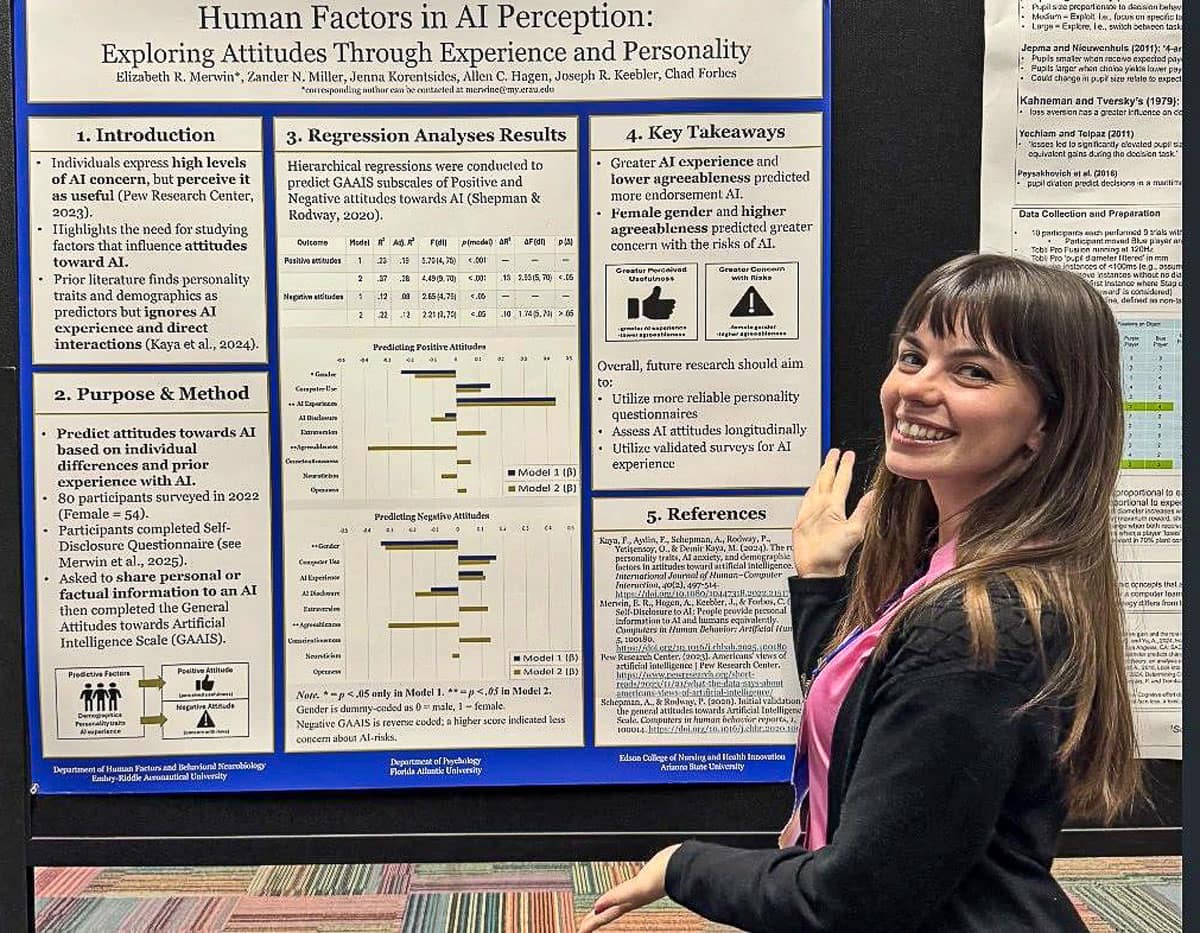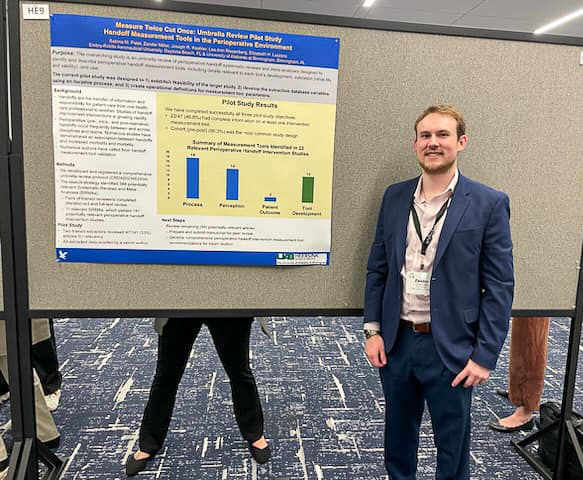Embry-Riddle Graduate Students Turn Human Factors and AI Research into Internship, Career Success

Jenna Korentsides never expected to land her dream job, working as a Human Factors engineer at Apple right after graduation.

Recent Human Factors Ph.D. graduate Jenna Korentsides has landed her dream job working as a Human Factors engineer at Apple. (Photo: Embry-Riddle/Melanie Stawicki Azam)
But that is exactly what happened – and she credited much of her success to the research experience she gained with her advisor Dr. Joseph R. Keebler, professor of Human Factors and director of the Embry‑Riddle Aeronautical University’s Small Teams Analog Research (STAR) Lab, which focuses on training and teamwork research in medical, aviation, military and consumer domains. This includes projects with the U.S. Navy and Naval Air Warfare Center Training Systems Division.
While working with Keebler, Korentsides published more than a dozen peer-reviewed journal articles, wrote successfully funded grants and had work accepted to national conferences.
Last summer, Apple reached out to Korentsides and offered her a summer internship as a hardware engineer at its California headquarters.
“I’m just really grateful,” said Korentsides, who earned her master’s and doctorate in Human Factors from Embry-Riddle and started her new job in September. “Here at Embry-Riddle, I’ve had so much opportunity.”
Korentsides is not the only student finding success in Keebler’s STAR lab, where students are exploring how AI can be applied to Human Factors with different industry teams to assess the technology’s benefits, risks and ethical considerations.
“The science of Human Factors is ultimately concerned with creating work systems that integrate humans with technology in a way that is safe, reliable, and intuitive,” said Keebler, who has 20 years of experience in Human Factors research. “With the widespread adoption of AI in most work environments, it's a great time to answer fundamental questions about how AI changes, enhances, or diminishes functioning in work teams.”
The Intersection of Human Factors and AI
With a background in design and extensive experience researching mixed-reality devices, Korentsides wanted to investigate how humans and AI could work together as a team. Her Ph.D. dissertation specifically explored ways Human-AI teams in high-stakes environments, like aviation, could potentially improve communication and coordination among teams and crews alike.
“I really love researching human and computer interactions,” said Korentsides, who is from Bergen County, New Jersey.

Human Factors Ph.D. student Elizabeth Merwin is researching how AI can be used in mental health. (Photo: Embry-Riddle/Elizabeth Merwin)Human Factors Ph.D. student Elizabeth Merwin is researching how AI can be used in mental health. She holds a master’s degree in psychology.
In August, Merwin published her first journal article, which looks at how people choose to disclose personal information with AI, as compared to a human.
She and Keebler are also collaborating with Andy Schneider, an assistant professor in the College of Aviation who directs the university’s Speech and Language AI Lab, to better understand how AI can be used to improve flight training.
“I think AI can be groundbreaking, if we use it in the right way,” said Merwin, who presented her research in October at the Human Factors and Ergonomics Society’s annual international conference in Chicago.
Working with Keebler, she is currently conducting experimental research on how AI affects teams in high-risk decision-making tasks. Additionally, she is involved in ongoing Naval research with Keebler to understand factors that contribute to excellent pilots. The researchers are analyzing large datasets of knowledge, skill and attitude assessments.
“I have been working in Dr. Keebler’s lab for a year and it’s a great environment,” said Merwin who is from Dade City, Florida. “He has a really good research partnership with the Navy and I’ve gotten a lot of hands-on experience doing statistical modeling.”

Human Factors Ph.D. student Zander Miller is focused on research in the health care industry. (Photo: Embry-Riddle/Zander Miller)Human Factors Ph.D. student Zander Miller is focused on research in the health care industry, including understanding how AI influences surgical teams. He is also collaborating with Dr. Elizabeth Lazzara, associate professor in the Department of Human Factors and Behavioral Neurobiology, who co-directs the Research Engineering and Applied Collaborations in Healthcare (REACH) Lab with Keebler.
This past summer, Miller interned at Nemours Children’s Hospital in Orlando, where he led projects focused on improving patient safety and understanding provider workload. Keebler’s expertise taught him how to navigate team dynamics, said Miller, while Lazzara shared with him her healthcare industry and patient care knowledge.
“Applying the skills I’ve learned from Drs. Keebler and Lazzara, I was able to provide input on training protocols when I was at Nemours,” said Miller, who is from Satellite Beach, Florida.
Miller also presented his research at the Human Factors and Ergonomics Society’s Health Care Symposium and was an author on two publications — one examining hospital telemetry monitoring and another studying leadership and teamwork in health care organizations.
Miller studied computer science and engineering as an undergraduate, but he also had interests in psychology and medicine. When he discovered Human Factors, he knew it was the right fit.
“This is a good middle ground for me to work with technology, but on the human side of things,” said Miller. “Human Factors looks at ways to have technology work best for users, so it’s the perfect trifecta for me personally.”

 Melanie Stawicki Azam
Melanie Stawicki Azam